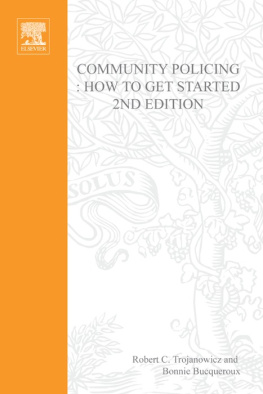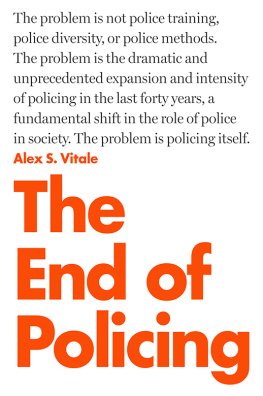Bonnie Bucqueroux - Community Policing: How to Get Started
Here you can read online Bonnie Bucqueroux - Community Policing: How to Get Started full text of the book (entire story) in english for free. Download pdf and epub, get meaning, cover and reviews about this ebook. year: 1998, publisher: Elsevier Science, genre: Politics. Description of the work, (preface) as well as reviews are available. Best literature library LitArk.com created for fans of good reading and offers a wide selection of genres:
Romance novel
Science fiction
Adventure
Detective
Science
History
Home and family
Prose
Art
Politics
Computer
Non-fiction
Religion
Business
Children
Humor
Choose a favorite category and find really read worthwhile books. Enjoy immersion in the world of imagination, feel the emotions of the characters or learn something new for yourself, make an fascinating discovery.
- Book:Community Policing: How to Get Started
- Author:
- Publisher:Elsevier Science
- Genre:
- Year:1998
- Rating:3 / 5
- Favourites:Add to favourites
- Your mark:
- 60
- 1
- 2
- 3
- 4
- 5
Community Policing: How to Get Started: summary, description and annotation
We offer to read an annotation, description, summary or preface (depends on what the author of the book "Community Policing: How to Get Started" wrote himself). If you haven't found the necessary information about the book — write in the comments, we will try to find it.
Community Policing.
Community Policing: How to Get Started — read online for free the complete book (whole text) full work
Below is the text of the book, divided by pages. System saving the place of the last page read, allows you to conveniently read the book "Community Policing: How to Get Started" online for free, without having to search again every time where you left off. Put a bookmark, and you can go to the page where you finished reading at any time.
Font size:
Interval:
Bookmark:
Community Policing
How to Get Started
Second Edition
Editor
Robert C. Trojanowicz
Bonnie Bucqueroux
Anderson Publishing
Community Policing: How to Get Started, Second Edition , Second Edition
Copyright 1998
Anderson Publishing Co.
2035 Reading Road
Cincinnati, OH 45202
Phone 800.582.7295 or 513.421.4142
Web Site www.andersonpublishing.com
All rights reserved. No part of this book may be reproduced in any form or by any electronic or mechanical means including information storage and retrieval systems without permission in writing from the publisher.
Library of Congress Cataloging-in-Publication Data
Trojanowicz, Robert C.
Community policing: how to get started/Robert Trojanowicz, Bonnie Bucqueroux.
2nd ed.
Cincinnati, OH: Anderson Pub. Co., c1998.
xxxiii, 139 p.; 26 cm.
0870848771 (pbk.)
Includes bibliographical references.
1. Community policing--United States. 2. Crime prevention--United States--Citizen participation. 3. Police-community relations--United States.
HV7936.C83 T76 1998
363.2/3/0973 21
Cover design by Tin Box Studio, Inc.
Acquisitions Editor Michael C. Braswell
This book is dedicated to all of the police administrators, upper command, supervisors, and officers who took risks with implementing and practicing community policing. You often met resistance, were ridiculed, and even forced to leave the department because of your commitment to providing community policing services to those citizens you served.
We salute you!
These heartfelt words were written by
Bob Trojanowicz during the last year of his life.
There is simply no way to thank Bob Trojanowicz for the support and opportunities he offered me. But more importantly, Bob influenced thousands of people at hundreds of police agencies for whom he offered a vision of the future where every officer could contribute to excellence.
Bob was the Ph.D. son of a beat cop father with an eighth-grade education, and he always said that it was his dad who taught him everything he knew about community policing. Bob felt that honoring his father meant devoting his life to giving line-level officers the responsibility and authority to do quality work.
It was this down-to-earth, pragmatic side, enriched by his work in the field, that allowed Bob to lead Michigan State University's School of Criminal Justice and the National Center for Community Policing to unparalleled respect within the worlds of policing and of academe. He knew that knowledge means nothing without wisdom, and that wisdom cannot change the world if no one hears or understands it. His lifelong goal was to open up the ivory tower and make it accessible and relevant to today's world in essence, practicing the principles of community policing within the university.
His dedication to community policing reform drove him to push himself harder than he should have. There was the time that Bob, who hated to fly, was due back from Brazil late at night. He had gone to Sao Paulo a second time, in a sincere effort to help the national police force embrace community policing as a means of ending the murder of the street children, often at the hands of police. The problem wounded Bob on many levels. Of course, his primary concern was for the hundreds of youngsters killed and injured each year, but it also pained him that police officers could participate in such monstrous acts. This is the kind of work that takes a toll beyond the hours and the physical and mental effort.
I had expected and hoped that Bob might slow down a bit and take a breather to recover after such an exhausting trip. Yet there he was, back on the job early the next morning, on almost no sleep. When I asked why he didn't pace himself a bit more after all, we want to be in this for the long haul he would say, But they need the help now.
Bob lived long enough to see his ideas take root, but sadly, his sudden death in 1994 robbed him of the chance to see community policing bloom. Indeed all who knew him wish that he was still here to clear away the dead branches and perhaps do a little pruning. Community policing remains a living and breathing entity, and Bob's many disciples will be the generation that shapes it in their communities. And we will all remember Bob's motto, Until we are all safe, no one is truly safe.
More Thanks
I would also like to take this opportunity to give personal and professional thanks to colleagues who have helped me in my attempts to carry on. In particular, I want to thank my friend Drew Diamond of the Police Executive Research Forum, who burns with the same messianic dedication. Thanks as well to Bill Matthews of the Community Policing Consortium, who informs the process with the special fervor that he brings from his work in public housing. Thanks also to Ira Harris and James McIver of the National Organization of Black Law Enforcement Executives for their sincere commitment to building community partnerships.
Thanks and best wishes to Leroy O'Shield, the chief of police for the Chicago Housing Authority and a Trojo disciple always willing to try new ideas. Heartfelt appreciation also to Harry Dolan, an extraordinarily talented chief in Grand Rapids, Michigan, who shared Bob's distaste for elitism. Bruce Benson, director of Michigan State University Department of Police and Public Safety, continues to implement Bob's vision. Special thanks as well to Chief Ron Sloan of Arvada, Colorado, another of the Trojo circle, many of whom are now taking their rightful place in positions of power.
Personal thanks to Bob's good friends John Henry Campbell, retired dean of the FBI Academy, and Robert Ressler, retired FBI profiler, for their continued support.
Within academe, Dr. Carl Taylor at Michigan State University honors Bob's memory with his work on community violence, and he carries on Bob's vision of building strong neighborhoods through his Center for Community Leadership. Thanks to Frank Ochberg, M.D., not only for his personal support of me and my efforts, but for his continuing commitment to the Critical Incident Analysis Group concept, which he co-founded with Bob Trojanowicz. This is the multi-disciplinary group that attempts to bring the knowledge of the university to bear on current events that shape our lives, such as building the FBI/Militia Hotline to facilitate communication with the goal of saving lives.
Special thanks to Bruce Shapiro, author of One Violent Crime (Harper Collins, 1998), for the exceptional intelligence and insight that he brings to our understanding of the dynamics of violence and the system's ability to address its many forms.
Stan Soffin, Bill Cot, and Sue Carter have sustained and nurtured me in my new home at Michigan State University's School of Journalism, with the Victims and the Media Program.
Personal Thanks
This book could not have been done without the unwavering support of my amazing husband Drew Howard, particularly during these last few years of loss. Sister Tina (the best sister in the world) did her best to keep me healthy along the way, while her husband (and my friend) Dave kept my computer humming. And my warmest thanks to my mother, Helen McLanus, for her independence and her continued personal growth she serves as an example to us all.
* * *
In remembrance of my stepdaughter Kim, who taught me that no matter how hard you try, you cannot save them all (http://members.aol.com/bucqui/kimmy).
Bonnie Bucqueroux
This book has been revised and reorganized to reflect changing needs and new questions in the field. It remains impossible to give a standardized list of rules that police agencies should follow to implement community policing. Instead, we present questions that can help each police agency find the right answers for them.
Font size:
Interval:
Bookmark:
Similar books «Community Policing: How to Get Started»
Look at similar books to Community Policing: How to Get Started. We have selected literature similar in name and meaning in the hope of providing readers with more options to find new, interesting, not yet read works.
Discussion, reviews of the book Community Policing: How to Get Started and just readers' own opinions. Leave your comments, write what you think about the work, its meaning or the main characters. Specify what exactly you liked and what you didn't like, and why you think so.



